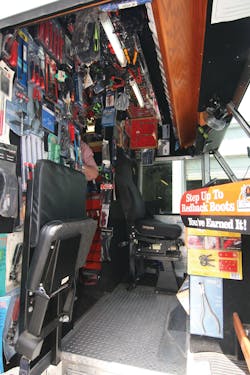Jonathan Winstel, who operates Matco Distribution Inc. of Monroe, Ga., has managed to survive six years as a distributor despite a difficult economic climate. The 31-year-old Winstel has learned how to survive largely through trial and error. His story offers some useful insights for others who are just starting out in the challenging business.
Two years ago, Winstel learned his most expensive lesson when his tool truck was stolen while he was attending a distributor convention. Because he didn’t have sufficient insurance, the loss set him back big time. He has since emerged a stronger distributor in an industry that doesn’t allow its members a lot of room for error.
“Insurance is a huge thing in this industry,” says Winstel, who realizes he could have protected himself against the loss at a much lower cost than he thought. For just another $50 a month, he would have been covered against the cost of the $60,000 he lost.
As hard as the knocks have been over the years, Wistel loves the tool business. “I like the fact that I see direct results of my work. The more I put in the more I get out.”
He was introduced to the business while working for an automotive body shop as a teenager. He bought tools from a Matco Tools truck. The tool truck owner eventually hired him to work on the truck part-time. “Ever since then, I wanted to do it,” Winstel says.
Winstel was 25 years old when he was able to qualify for enough credit to buy his own tool truck. He acquired a franchise that he had previously bought from when he worked in a body shop.
Pre-recession was best year ever
Winstel was able to build the customer base in his first year, which was his best year ever. In 2006, the market he serves, a 35-mile radius region located an hour east of Atlanta, had not yet been hit by the recession. Visiting an average 20 stops per day, he did about $500,000 in sales in his first year, doing little in the way of promoting products to customers.
Everything changed in mid 2007 when the recession hit. Many of his auto dealer customers closed. Many of the automotive shops became less busy as consumers had less money to spend. Credit card companies also became less generous with customers, leaving them with less money to spend.
Winstel worked at finding independent repair shops to sustain his customer base. He also learned he needed to find new ways to encourage people to buy more products. “You just have to find different ways to approach it and bring your sales up,” he says. “You definitely have to tote and promote more than you used to.”
He made it a point to run contests. One of his favorite techniques is to have a “punch board” in his truck. This is a board with 1,200 holes in it. Every time a customer makes a purchase or a payment, they get to punch a certain number of holes based on the size of the purchase or the payment. A $50 payment or a $100 purchase will allow a customer to punch three holes, for instance. Customers are awarded prizes, such as apparel or tools, based on the number of holes they punch.
“The more you bought and paid to your account, the more punches you get,” he says.
Winstel makes the holidays a special time for customers by giving away merchandise he has earned from his own credit card purchasing and freebies from his suppliers. These giveaways, however, become challenging at Christmas since customers come to expect free things at that time of year. “They always expect something for Christmas from you and they’re never happy, no matter what you give. For some reason, they expect a shirt, a hat, a jacket, or a tool, all for Christmas.”
He dresses a tool box with Christmas décor and divides it into four sections, based on how much customers spend during the week on average: $20, $40, $50 and $100. Customer receipts are placed in the appropriate section and are redeemed for prizes. “The better customer you are, the better prizes you get,” he says.
Winstel tries to capitalize on the Christmas spirit as well. While he gives away merchandise, he asks customers to pay $10 more a week to make up for the week they didn’t pay him anything. “You always have to find a way around ‘the customer’s always right.’ You have to make it work in your favor with the gift of gab.”
The credit crunch hasn’t been all bad for Winstel. Some automotive shops that previously bought tools online found they had less credit available with Internet merchants and began to buy more from him. “Those guys now are coming to us (mobile distributors) more. They no longer have the credit (with the Internet merchants).”
2010: Disaster strikes
The business was improving from the recession when Winstel’s truck was stolen in 2010, delivering a major financial setback. The truck was stolen from his mother’s house while he attended a distributor meeting out of state. The police found the truck in a shopping mall parking lot with all merchandise removed.
Fortunately, another Matco Tools distributor allowed him to borrow a trailer and Matco Tools gave him credit to replenish his inventory. Surprisingly, Winstel had his best month ever while working out of the borrowed trailer.
Winstel used the trailer for three months before his own truck was repaired. “It takes a lot more time than you think,” Winstel says about the claims processing. “It was a total ‘time vampire.’”
Challenge: Keeping customers current
Because the business relies more on smaller purchases than it once did, Winstel has found it necessary to work hard to encourage customers to stay current on payments.
The Matco Tools financing software works out a payment schedule. If the payments are not made on time, the sale will not yield the necessary profit. Winstel has learned he needs to make 33.3 percent gross margin to make money on a sale.
Getting customers to stay current on their payments requires strong personal customer relations skills. It is an area that Winstel considers himself good at. While knows how to make “small talk” with people, he makes sure he directs the conversation to business after five to 10 minutes. “You always try and bring it back to the tools,” he says. “You have to step up and realize, ‘I’m not here to talk about hunting or about sports.’”
“If you spend a little extra time, you can get something from them,” he says. In many cases, the customer has the money to pay but is hoping for some additional time. “They’re just trying to push that envelope,” Winstel says. “If you push back a little bit, they usually do give you something.”
“There is no ‘next week’ for the tool guy,” he says. He tells customers that if they skip this week, they aren’t going to pay him double next week.
Winstel has learned there is an art to asking for money. “I have to not be rude,” he says. “I do it (ask for money) in a joking manner. A lot of the time, they (the customer) get it. If they don’t, you say, ‘hey, it’s not working out.”
He also makes it a point to learn when the techs get paid. If he shows up on pay day, he knows he is more likely to get a payment. “It’s all about observing,” he says.
“Have a friendly relationship and business sense,” he says.
“They think, ‘he’s my friend and he’ll let me slide.’ They’re the ones that’ll disappear the quickest.”
Some customers have required a lot of work if they had bad experiences with previous distributors. “It’s not just a brand; it’s personality, too,” he says. “People are loyal to individuals.”
He makes it a point to always go into the shop. “If you’re not going into a majority of your shops, there’s something wrong with you,” he says.
Winstel has learned that national service chains are worth cultivating as customers. He says some tool distributors don’t like national chains since they have a lot of technician turnover. “Some of these guys you’d be surprised; they have impeccable credit.” Some of the techs in these shops have $20,000 worth of credit.
Customer financing helps
Winstel finds the Matco finance program one of his strongest selling tools for today’s credit-strapped customer. “I don’t think I could do it without Matco,” he says.
He recalls the time when customer owed $15,000 for a tool box and was falling behind on payments. Matco worked out an arrangement with the shop owner, whereby the shop automatically deducted a certain amount for three years until the payment was complete. There was no penalty charged for the tardy payment.
Another key selling point is the Matco warranty. “If it’s Matco, I warranty it,” he says.
He has also replaced other companies’ tools if he thinks it will win him future business.
Customers sometimes tell him they can get the same tools for less at “big box” store. He responds that the “big box” store will not give credit and they don’t have as much product variety.
Sometimes they say something is available for less money on eBay, and he tells them when they need it repaired they can try and send it back to eBay. “Nothing’s for free,” he tells his customers.
Winstel has slowly recovered from his setbacks: 2011 was better than 2010, and 2012 is on track to surpass 2011. The new diagnostic tools are helping him in particular. “It’s definitely still fun,” he says of the tool truck business.
Top 5 Tools
¼” Infinium battery powered
ADV socket line/Impact socket line
Matco tool boxes 4325, 4225
Infium ¼” ratchet 12V
Ingersoll MT1769A ½” composite Impact 1100 ft/lbs.
About the Author

